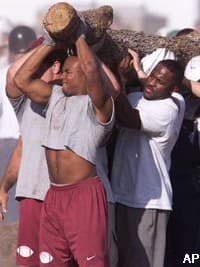Current Aggies still remember Bonfire

Texas A&M head coach Mike Sherman has known an A&M with and without Bonfire. Aggieland hasn't had a sanctioned Bonfire on campus since the 1999 collapse, which obviously means there was no Bonfire in Sherman's first season as head coach. But as an assistant at A&M from 1989-93 and against from 1995-96 Sherman saw Bonfire up close.
Already in the NFL in 1999 when Bonfire collapsed, Sherman wasn't in College Station but the news of the collapse shook him to his core.
Advertisement
"I remember hearing it on the radio. I was driving in the car and I'm not exactly sure where I was, but I remember pulling over to the side of the road and trying to assimilate all the information," Sherman said. "At the time it shook me like when 9/11 happened. It was a similar thing. Obviously a lot less families were involved in this, but it certainly was enough families and enough people to stop and take a deep breath and pause and reflect for a little bit."
Sherman and special teams/tight ends coach Kirk Doll both coached at A&M in the early 90s while Bonfire was still burning, but no other coach or player was involved with A&M while Bonfire still burned. This year's seniors were just 12 or 13 in 1999, so their memories are a little hazy.
But that doesn't mean that the current Aggies are any less knowledgeable of the event as it's obviously shaken each one even years later.
"I didn't know much about A&M at the time, but I do remember the Bonfire and hearing about it. I didn't really have an understanding of it until I got here, and I really didn't know what the Bonfire meant to A&M until I got here," said A&M senior safety Jordan Pugh. "Hearing about it and learning about it, it was big and big for me especially playing football here and seeing what it meant. It makes me want to play harder for those people who died there."
Some current Aggies, like junior quarterback Jerrod Johnson, had much more knowledge of Bonfire. Johnson's father, the late Larry Johnson, was a wide receiver at A&M in the late 1970s.
So Johnson knew about Bonfire, but much like Pugh it wasn't until he got to Aggieland that he found out truly what it meant to Aggies everywhere.
"I never attended Bonfire, but I know when it did happen (my father) tried to explain to me how important it was to A&M at the time. But I was a kid and was just like yeah it's one of those things A&M does," Johnson said. "But being here and understanding the sacrifice that they put in just for a tradition to be upheld and then they lost their lives for it just puts in perspective how special this school is and passionate people are about A&M. At the time my dad tried to explain it to me but I was just a little kid, but now it definitely brings into light what he was trying to explain to me back then."